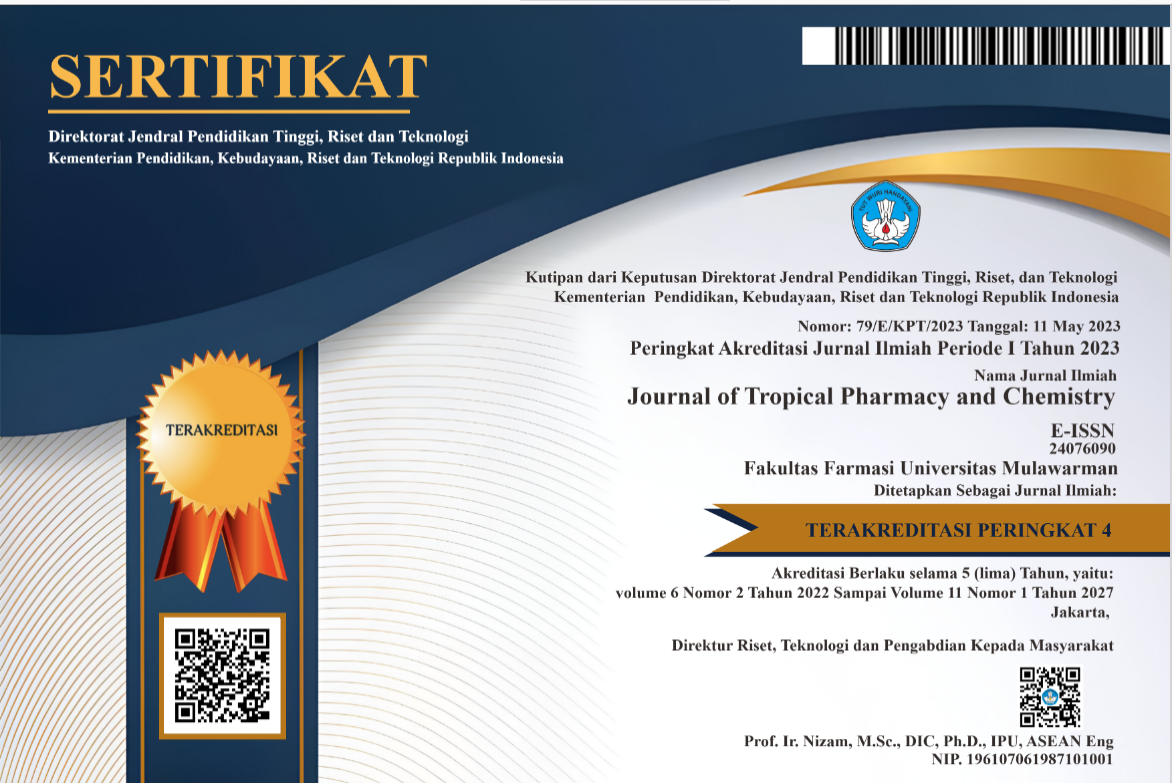Formulation and Evaluation of an Antifungal Ointment Containing Zingiber officinale Roscoe (Zingiberaceae) Essential Oil as Active Principle
DOI:
https://doi.org/10.30872/j.trop.pharm.chem.v6i1.221Keywords:
Essential oil, Zingiber officinale, antifungal, ointmentsAbstract
The increase incidence of fungal infections, the resistance of fungal strains to existing drugs and the toxicity assimilated to long term usage of antifungal drugs as prompted the search of new alternative from natural source. In this study we have evaluated the antifungal properties of the essential oil of the rhizome of Z. officinale, a plant known for its various biological properties and used in food industry as spice. An antifungal ointment with Z. officinale essential oil as active principle was also formulated and its antifungal properties evaluated. GC/MS analysis identified Zingiberene (22.36%), 1.8-cineole (15.54%), geranial (11.91%), camphene (11.09%) and geraniol (8.75%) as the main constituents of Z. officinale essential oil obtained by hydrodistillation. The oil showed a significant antifungal activity against clinical isolate of Candida krusei with MIC 800 ppm by microdilution method. The formulated ointment containing 10 % glycerol, 60 % vaseline, 8 % hydrosol, 20% lanolin and 2% Zingiber officinale essential oil (Formule E1) was found to follow pharmaceutical standards according to European Pharmacopeia and also showed good antifungal properties
Downloads
References
Bitar D, Che D, Ancelle T, Fuhrman C, 2013. Bulletin épidémiologique hebdomadaire. 107–108.
Develoux M, Bretagne S, 2005. Candidoses et levuroses diverses. EMC - Maladies Infectieuses, 2(3), 1–15. https://doi.org/10.1016/s1166-8598(05)26088-x
Barelle C J, Richard M L, Gaillardin C, Gow N A R., Brown A J P, 2006. Candida albicans VAC8 is required for vacuolar inheritance and normal hyphal branching. Eukaryotic Cell, 5(2), 359–367. https://doi.org/10.1128/EC.5.2.359-367.2006
Andriatsihoarana S.M., 2010. Contribution a l ’ etude de l ’ huile Andriatsihoarana Sitraka Mbolanirina Andriatsihoarana Sitraka Mbolanirina.
Sudberry P E, 2001. The germ tubes of Candida albicans hyphae and pseudohyphae show different patterns of septin ring localization. Molecular Microbiology, 41(1), 19–31. https://doi.org/10.1046/j.1365-2958.2001.02459.x
Beristain-Bauza S D C, Hernández-Carranza P, Cid-Pérez TS, Ávila-Sosa R, Ruiz-López I I, Ochoa-Velasco C E, 2019. Antimicrobial activity of ginger (Zingiber officinale) and its application in food products. Food Reviews International, 35(5), 407-426.
Zick S M, Djuric Z, Ruffin M T, Litzinger A J, Normolle D P, Alrawi S, Feng M R, Brenner D E, 2008. Pharmaconkinetics of 6-Gingerol, 8-Gingerol, 10-Gingerol, and 6-Shogaol and Conjugate Metabolites in Healthy Human Subjects. Cancer Epidemil. Biomarkers Prev 17, 1930–1936. DOI: 10.1158/1055-9965.EPI-07-2934
Massiot G, 1994. Pharmacognosie: Phytochimie, Plantes Médicinales:?: By J. Bruneton, 2nd Edn, Tec Doc, Paris, 1993. 928pp. 78OF ISBN 2-85206-911-3. Phytochemistry, 36, 258.
Clinical and Laboratory Standards Institute (CLSI), 2008. Reference method for broth dilution. Reference Method for Broth Dilution Antifungal Susceptibility Testing of Yeasts. Approved Standard, 3th Ed., 28(14), 0–13. https://clsi.org/media/1461/m27a3_sample.pdf
Biyiti F, Tamze V, Nnanga N, 2009. Formulation d’une pommade antibactérienne à base d’un extrait éthanolique des écorces du tronc de tabernaemontana crassa benth. Centre de Recherche En Plantes Médicinales et En Médecine Traditionnelle de l’Institut de Recherche Médicale et d’Etude Des Plantes Médicinales (IMPM), 15(January), 1–15.
Bates R G, 1973. Determination of pH; theory and practice. Wiley.
Abdulfattah S, 1991. Stabilité et conditionnement de problèmes de points-selles et loi des grands nombres en analyse épi/hypographique. http://www.theses.fr/1991MON20282
Europe Conseil, 2007. Pharmacopée européenne 6ème Édition (Issue vol.~1~à~2). Conseil de l’Europe. https://books.google.cm/books?id=W-EOJQAACAAJ
Akakpo-akue M, 2009. Évaluation de l’activite antifongique et essai clinique d’une creme formulee a base de l’extrait x12 de Terminalia catappa, sur quelques mycoses superficielles. 13, 175–190.
WHO, 2007. WHO guidelines for assessing quality of herbal medicines with reference to contaminants and residues.
Bouin A S, Wierer M, 2014. Quality standards of the European Pharmacopoeia. Journal of Ethnopharmacology, 158(PART B), 454–457. https://doi.org/10.1016/j.jep.2014.07.020
Bouin A S, Wierer M, 2014. Quality standards of the European Pharmacopoeia. Journal of Ethnopharmacology, 158(PART B), 454–457. https://doi.org/10.1016/j.jep.2014.07.020
Bouin A S, Wierer M, 2014. Quality standards of the European Pharmacopoeia. Journal of Ethnopharmacology, 158(PART B), 454–457. https://doi.org/10.1016/j.jep.2014.07.020
Pozzatti P, Loreto É S, Lopes P G M, Athayde M L, Santurio J M, Alves S H, 2010. Comparison of the susceptibilities of clinical isolates of Candida albicans and Candida dubliniensis to essential oils. Mycoses, 53(1), 12–15. https://doi.org/10.1111/j.1439-0507.2008.01643.x
Sivasothy Y, Chong W K, Hamid A, Eldeen I M, Sulaiman S F, Awang K, 2011. Essential oils of Zingiber officinale var. rubrum Theilade and their antibacterial activities. Food Chemistry, 124(2), 514–517. https://doi.org/10.1016/j.foodchem.2010.06.062
Zouari N, 2013. Essential Oils Chemotypes: A Less Known Side. Medicinal & Aromatic Plants, 02(02). https://doi.org/10.4172/2167-0412.1000e145
Goetz P, Ghedira K, 2012. Introduction à la phytothérapie anti-infectieuse. In Phytothérapie anti-infectieuse (pp. 3–14). Springer Paris. https://doi.org/10.1007/978-2-8178-0058-5_1
Leite M C A, De Brito Bezerra A P, De Sousa J P, Guerra F Q S, De Oliveira Lima E, 2014. Evaluation of antifungal activity and mechanism of action of citral against Candida albicans. Evidence-Based Complementary and Alternative Medicine https://doi.org/10.1155/2014/378280
Kalafat S, Madjbar K, 2017. Extraction d'huile essentielle, application a la formulation d'une pommade antiinflammatoire. Memoire en Genie des Procedes. Universite de BIDA 1. 2017
Downloads
Published
Issue
Section
License
Copyright (c) 2022 Nelly Tagnin Nkuete, Sandra Leila Nnanga, Stephanie Tamdem Guetchueng, Nga Nnanga, Joseph Ngoupayo (Author)

This work is licensed under a Creative Commons Attribution-NonCommercial 4.0 International License.




